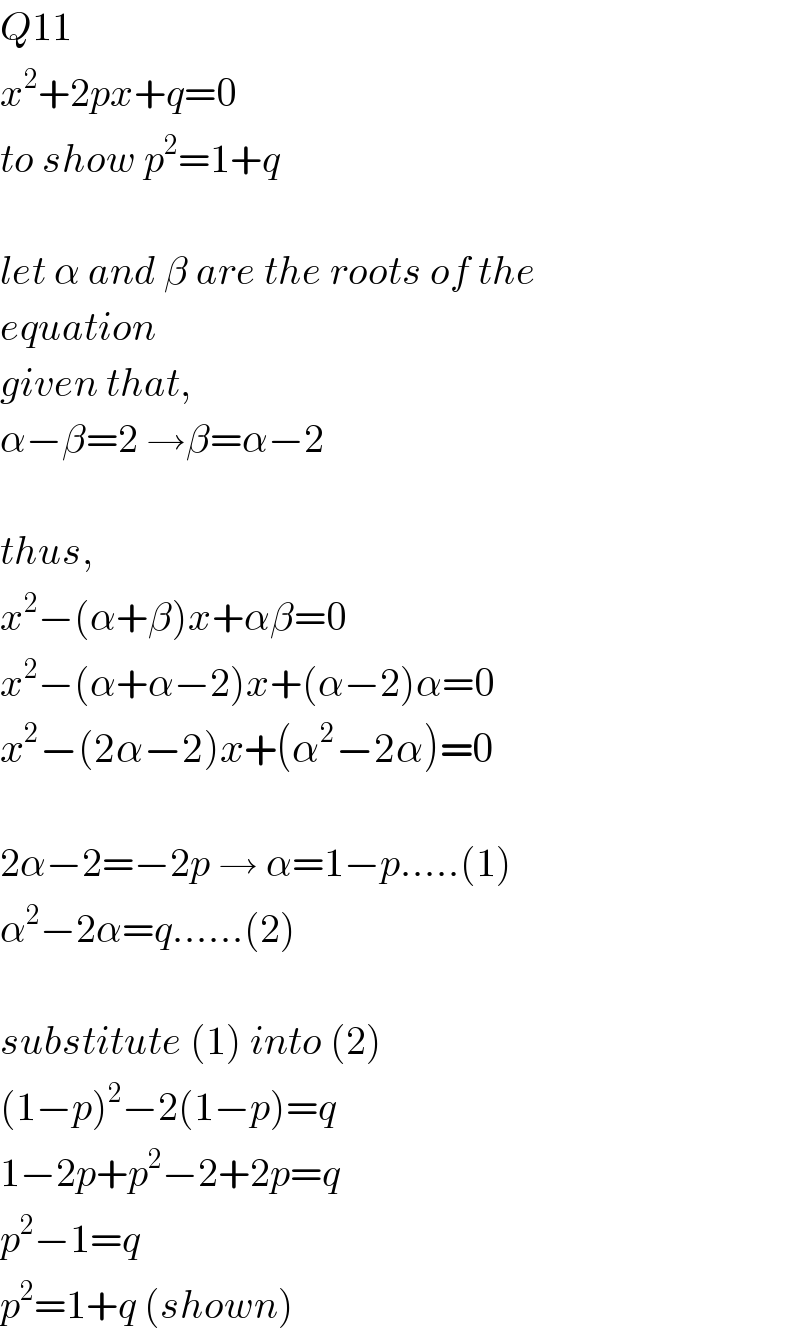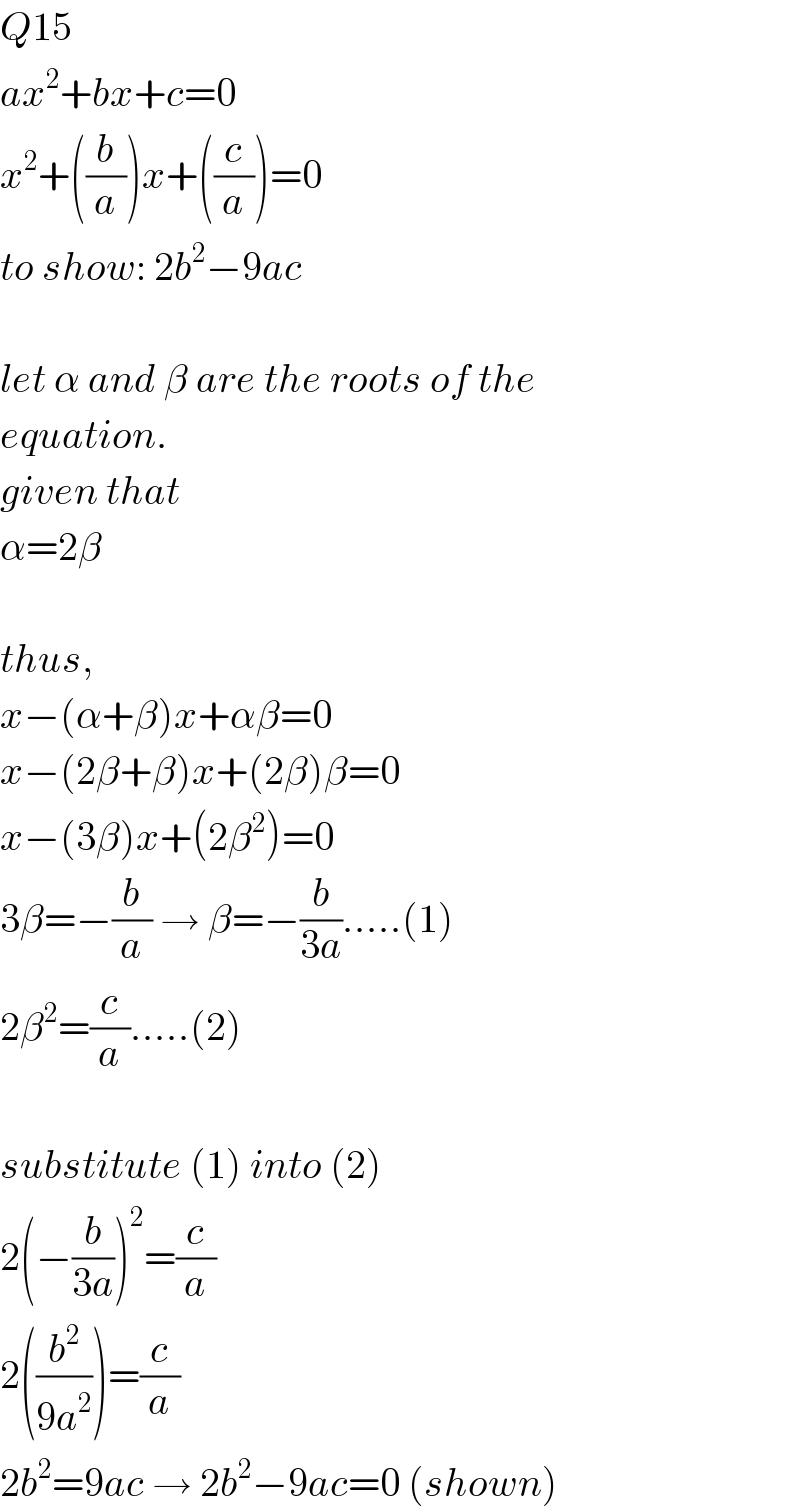
Question Number 120929 by Canovas last updated on 04/Nov/20

Commented by Canovas last updated on 04/Nov/20

$$\:\:\:{Please}\:{help}\:{me}\:{on}\:{number}\:\mathrm{11}\:{and}\:\mathrm{15} \\ $$$$ \\ $$
Commented by liberty last updated on 04/Nov/20
it is better if you write
Answered by Ar Brandon last updated on 04/Nov/20

$$\mathrm{15}. \\ $$$$\mathrm{ax}^{\mathrm{2}} +\mathrm{bx}+\mathrm{c}=\mathrm{0} \\ $$$$\mathrm{Let}\:\mathrm{the}\:\mathrm{roots}\:\mathrm{be}\:\alpha\:\mathrm{and}\:\mathrm{2}\alpha \\ $$$$\mathrm{SumOfRoots}:\mathrm{3}\alpha=−\frac{\mathrm{b}}{\mathrm{a}}\Rightarrow\alpha=−\frac{\mathrm{b}}{\mathrm{3a}} \\ $$$$\mathrm{ProductOfRoots}:\mathrm{2}\alpha^{\mathrm{2}} =\frac{\mathrm{c}}{\mathrm{a}} \\ $$$$\Rightarrow\mathrm{2}\left(\frac{\mathrm{b}}{\mathrm{3a}}\right)^{\mathrm{2}} =\frac{\mathrm{c}}{\mathrm{a}}\:\Rightarrow\:\mathrm{2b}^{\mathrm{2}} =\mathrm{9ac} \\ $$
Answered by Ar Brandon last updated on 04/Nov/20

$$\mathrm{11}. \\ $$$$\mathrm{x}^{\mathrm{2}} +\mathrm{2px}+\mathrm{q}=\mathrm{0} \\ $$$$\mathrm{Let}\:\mathrm{roots}\:\mathrm{be}\:\beta\:\mathrm{and}\:\beta+\mathrm{2} \\ $$$$\mathrm{SumOfRoots}:\:\mathrm{2}\beta+\mathrm{2}=−\mathrm{2p}\Rightarrow\beta=−\left(\mathrm{p}+\mathrm{1}\right) \\ $$$$\mathrm{ProductOfRoots}:\:\beta^{\mathrm{2}} +\mathrm{2}\beta=\mathrm{q} \\ $$$$\Rightarrow\left(\mathrm{p}+\mathrm{1}\right)^{\mathrm{2}} −\mathrm{2}\left(\mathrm{p}+\mathrm{1}\right)=\mathrm{q} \\ $$$$\Rightarrow\left(\mathrm{p}+\mathrm{1}\right)\left(\mathrm{p}+\mathrm{1}−\mathrm{2}\right)=\mathrm{q} \\ $$$$\Rightarrow\left(\mathrm{p}+\mathrm{1}\right)\left(\mathrm{p}−\mathrm{1}\right)=\mathrm{q} \\ $$$$\Rightarrow\mathrm{p}^{\mathrm{2}} −\mathrm{1}=\mathrm{q},\:\mathrm{p}^{\mathrm{2}} =\mathrm{1}+\mathrm{q} \\ $$
Answered by ebi last updated on 04/Nov/20

$${Q}\mathrm{11} \\ $$$${x}^{\mathrm{2}} +\mathrm{2}{px}+{q}=\mathrm{0} \\ $$$${to}\:{show}\:{p}^{\mathrm{2}} =\mathrm{1}+{q} \\ $$$$ \\ $$$${let}\:\alpha\:{and}\:\beta\:{are}\:{the}\:{roots}\:{of}\:{the} \\ $$$${equation} \\ $$$${given}\:{that}, \\ $$$$\alpha−\beta=\mathrm{2}\:\rightarrow\beta=\alpha−\mathrm{2} \\ $$$$ \\ $$$${thus}, \\ $$$${x}^{\mathrm{2}} −\left(\alpha+\beta\right){x}+\alpha\beta=\mathrm{0} \\ $$$${x}^{\mathrm{2}} −\left(\alpha+\alpha−\mathrm{2}\right){x}+\left(\alpha−\mathrm{2}\right)\alpha=\mathrm{0} \\ $$$${x}^{\mathrm{2}} −\left(\mathrm{2}\alpha−\mathrm{2}\right){x}+\left(\alpha^{\mathrm{2}} −\mathrm{2}\alpha\right)=\mathrm{0} \\ $$$$ \\ $$$$\mathrm{2}\alpha−\mathrm{2}=−\mathrm{2}{p}\:\rightarrow\:\alpha=\mathrm{1}−{p}.....\left(\mathrm{1}\right) \\ $$$$\alpha^{\mathrm{2}} −\mathrm{2}\alpha={q}......\left(\mathrm{2}\right) \\ $$$$ \\ $$$${substitute}\:\left(\mathrm{1}\right)\:{into}\:\left(\mathrm{2}\right) \\ $$$$\left(\mathrm{1}−{p}\right)^{\mathrm{2}} −\mathrm{2}\left(\mathrm{1}−{p}\right)={q} \\ $$$$\mathrm{1}−\mathrm{2}{p}+{p}^{\mathrm{2}} −\mathrm{2}+\mathrm{2}{p}={q} \\ $$$${p}^{\mathrm{2}} −\mathrm{1}={q} \\ $$$${p}^{\mathrm{2}} =\mathrm{1}+{q}\:\left({shown}\right) \\ $$
Answered by ebi last updated on 04/Nov/20

$${Q}\mathrm{15} \\ $$$${ax}^{\mathrm{2}} +{bx}+{c}=\mathrm{0} \\ $$$${x}^{\mathrm{2}} +\left(\frac{{b}}{{a}}\right){x}+\left(\frac{{c}}{{a}}\right)=\mathrm{0} \\ $$$${to}\:{show}:\:\mathrm{2}{b}^{\mathrm{2}} −\mathrm{9}{ac} \\ $$$$ \\ $$$${let}\:\alpha\:{and}\:\beta\:{are}\:{the}\:{roots}\:{of}\:{the} \\ $$$${equation}. \\ $$$${given}\:{that} \\ $$$$\alpha=\mathrm{2}\beta \\ $$$$ \\ $$$${thus}, \\ $$$${x}−\left(\alpha+\beta\right){x}+\alpha\beta=\mathrm{0} \\ $$$${x}−\left(\mathrm{2}\beta+\beta\right){x}+\left(\mathrm{2}\beta\right)\beta=\mathrm{0} \\ $$$${x}−\left(\mathrm{3}\beta\right){x}+\left(\mathrm{2}\beta^{\mathrm{2}} \right)=\mathrm{0} \\ $$$$\mathrm{3}\beta=−\frac{{b}}{{a}}\:\rightarrow\:\beta=−\frac{{b}}{\mathrm{3}{a}}.....\left(\mathrm{1}\right) \\ $$$$\mathrm{2}\beta^{\mathrm{2}} =\frac{{c}}{{a}}.....\left(\mathrm{2}\right) \\ $$$$ \\ $$$${substitute}\:\left(\mathrm{1}\right)\:{into}\:\left(\mathrm{2}\right) \\ $$$$\mathrm{2}\left(−\frac{{b}}{\mathrm{3}{a}}\right)^{\mathrm{2}} =\frac{{c}}{{a}} \\ $$$$\mathrm{2}\left(\frac{{b}^{\mathrm{2}} }{\mathrm{9}{a}^{\mathrm{2}} }\right)=\frac{{c}}{{a}} \\ $$$$\mathrm{2}{b}^{\mathrm{2}} =\mathrm{9}{ac}\:\rightarrow\:\mathrm{2}{b}^{\mathrm{2}} −\mathrm{9}{ac}=\mathrm{0}\:\left({shown}\right) \\ $$
Answered by mindispower last updated on 04/Nov/20

$${X}^{\mathrm{2}} +\mathrm{2}{pX}+{q}=\mathrm{0}..{E} \\ $$$${let}\:{a},{b}\:{roots}\:{of}\:\:{b}−{a}=\mathrm{2} \\ $$$${we}\:{have}\:{b}+{a}=−\mathrm{2}{p}\Rightarrow{p}=−\left(\frac{{b}+{a}}{\mathrm{2}}\right) \\ $$$${ab}={q},{p}^{\mathrm{2}} =\frac{\mathrm{1}}{\mathrm{4}}\left({b}^{\mathrm{2}} +{a}^{\mathrm{2}} +\mathrm{2}{ab}\right)=\frac{\mathrm{1}}{\mathrm{4}}\left(\left({b}−{a}\right)^{\mathrm{2}} +\mathrm{4}{ab}\right) \\ $$$$=\frac{\mathrm{1}}{\mathrm{4}}\left(\mathrm{2}^{\mathrm{2}} +\mathrm{4}{q}\right)=\mathrm{1}+{q}={p}^{\mathrm{2}} \\ $$
